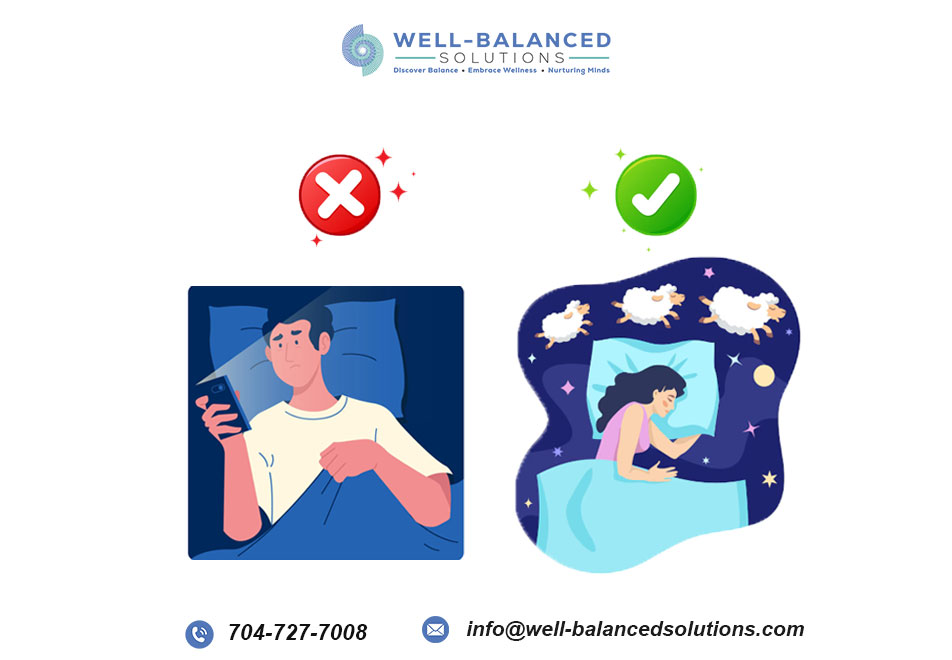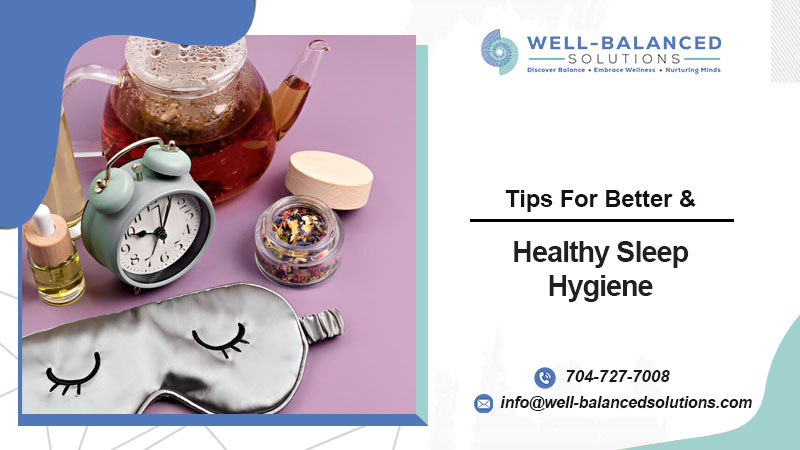Getting good sleep is just as important as eating healthy food and staying lively. When we sleep properly, our body rests and our thoughts get stronger. On the other hand, poor sleep can make our day harder. It can lower our focus, increase stress, and impact our overall well-being. That’s where healthy sleep hygiene comes in. It’s a set of simple habits that help improve sleep naturally.
From maintaining a regular sleep schedule to creating a tranquil bedtime routine, each habit plays a significant role. By learning and implementing these healthy sleep hygiene tips, we not only support our body and mind but also gain a sense of empowerment. As a result, we feel more balanced, focused, and ready to conquer the day ahead.
What is Healthy Sleep Hygiene?
Healthful sleep hygiene methods promote good sleep behaviour. It helps your brain and body rest well. Your body has a clock called the sleep cycle. This cycle tells you when to sleep and wake up. Good sleep routines help you feel fresh, think clearly, and stay focused during the day.
15 Proven Healthy Sleep Hygiene Tips
1. Set a Consistent Sleep Schedule
Waking up and sleeping at the same time daily trains your body. It builds a rhythm that your brain begins to trust. Even on weekends, try to stick to the same routine. A stable schedule supports good sleep hygiene. Over time, your sleep becomes deeper and easier. That’s how sleeping habits become stronger.
2. Create a Relaxing Bedtime Routine
Engaging in calming activities before bedtime, such as reading, listening to soft music, or doing breathing exercises, helps your body slow down and signals your mind that it’s time to rest. This peaceful routine is a crucial component of healthy sleep hygiene, resulting in improved sleep night after night.
3. Limit Exposure to Screens Before Bed

Screens give off intense light that keeps your brain alert. So, turn off TVs and phones at least an hour before bed. Choose quiet activities, such as drawing or talking. These changes support tips for sleep hygiene. Reducing screen time helps your eyes and mind relax. It’s a simple but strong step.
4. Avoid Heavy Meals at Night
Eating big meals late can upset your body. Your stomach stays busy, which makes falling asleep harder. Try light snacks if you are hungry. This slight shift supports hygiene sleep practices. Eating dinner early and keeping it simple helps your body relax. Sleep comes more easily when your digestion is calm.
5. Control Room Temperature and Light
Your bedroom should feel calm, dark, and quiet. These settings signal to your body that it’s time for rest. Use dark curtains and a sleep mask if needed. A cosy room helps foster healthy sleep hygiene habits. Small changes like this can make a significant impact. Your sleep will feel smoother and deeper.
6. Use a Comfortable Mattress and Pillows
Your bed needs to be both tender and supportive. A good mattress and pillows can ease body pain and help you relax. Over time, this adds up to better rest. Comfort is a key part of good sleep hygiene. When your body feels supported, your sleep improves. Invest in your sleep space wisely.
7. Reduce Caffeine and Alcohol Intake
Caffeine stays in your system for hours and keeps you alert. Alcohol may make you sleepy at first, but disrupts deep rest later. Try water and herbal tea instead in the evening. These choices improve your sleeping habits gently. What you drink matters more than you think. Healthy drinks support healthy nights.
8. Get Daily Sunlight and Physical Activity
Daylight helps control your sleep-wake cycle. Even a short walk can make your body feel balanced. Regular movement also helps reduce stress, which in turn supports rest. These simple habits support strong sleep hygiene. When the body moves, the brain sleeps better. So, stay active during the day for smoother nights.
9. Manage Stress Before Bedtime
A calm mind leads to better sleep. Use journaling, deep breathing, and quiet reading to lower stress. These actions guide your brain to feel safe. That’s a big part of healthy sleep hygiene tips. Relaxing your thoughts helps you fall asleep faster. Create a calm space before bedtime.
10. Keep Naps Short and Early
Naps can be beneficial, but only in moderation. Keep them under 30 minutes and take them before late afternoon. That way, they won’t disturb your night’s rest. A balanced nap supports healthy sleep without harm. When used wisely, naps recharge you. Timing is everything in sleep habits.
11. Listen to Calming Music and Use Sleep Apps
Gentle sounds like rain and soft music can help your brain slow down. Some apps even guide your breathing or play relaxing sounds. These tools make falling asleep easier. It’s a smart way to support good sleep hygiene. Sound and rhythm bring comfort at bedtime. Try different options and see what works best for you.
12. Use Bed Only for Sleep, Not Work
Your brain connects places with actions. If you work, watch TV, and scroll in bed, your brain stays active. Use your bed only for rest and sleep. This strengthens your healthy sleep hygiene habits. Let your mind link your bed with peace. That way, sleep comes naturally and easily.
13. Journal Your Thoughts Before Sleeping
Some nights, thoughts feel too loud. Writing down your worries helps your brain let go. It brings clarity and calm before sleep. Journaling supports sleeping habits and clears mental clutter. A few minutes of writing can bring deep peace. Let your notebook catch what your brain wants to release.
14. Avoid Overthinking at Night

When the room is quiet, your brain might start racing. Try thinking happy, simple thoughts instead. Use breathing exercises and focus on relaxing images to help you unwind and relax. These tricks help stop the cycle of worry. This habit boosts healthy sleep hygiene tips. Train your thoughts to rest, just as your body does.
15. Be Patient and Track Progress
Good sleep habits take time to grow. Some nights may be more complex than others. Keep going and write down what works. Small steps lead to significant changes over time. Tracking your progress supports your sleep hygiene journey. Patience turns habits into long-lasting sleep success.
Why Choose WBS Mental Wellness?
WBS Mental Wellness truly cares about your sleep and mental well-being. It helps you sleep better and feel calm every day. With expert counselling, gentle sleep programs, and simple lifestyle coaching, WBS makes healthy sleep easy to follow. You don’t have to do it alone.
Get the help you need with WBS sleep hygiene coaching or choose mental health support at WBS. Each step is made just for you. From the first talk to the final result, they stand by you. Try WBS Mental Wellness today and feel the peace you deserve. It’s not just help, it’s care, made simple.
Conclusion
A good night’s sleep brings a happy mind and a healthy life. That’s why healthy sleep hygiene tips matter. When you sleep well, you feel strong, calm, and ready each day.
So, take small steps. Rest more. Get support if needed. You are not alone. WBS is here for you. Start building better sleep hygiene today with trusted guidance from WBS.
FAQS
Q. What is good sleep hygiene, and why does it matter?
Good sleep hygiene refers to behaviours that help you sleep well every night. It enhances your sleep and keeps your mind sharp.
Q. How can I practice better sleep hygiene at night?
Ways to Be a Better Sleeper: dimming lights, avoiding screens, going to bed at the same time, and relaxing before sleep can help.
Q. Can bad sleep hygiene impact your mental health?
Yes, poor sleep habits can contribute to stress and feelings of sadness. Good sleep hygiene helps maintain your emotional stability and mental well-being.
Q. What are some proven tips for good sleep hygiene?
Some tips include maintaining regular sleep times, limiting caffeine intake, taking short naps, relaxing before bed, and keeping a dark and cool bedroom.
Q. Why Does Sleep Hygiene Matter for Mental Health?
The effects of healthy sleep hygiene on mental health include reduced anxiety, better mood control, and lower depression rates, according to the CDC and medical studies.







